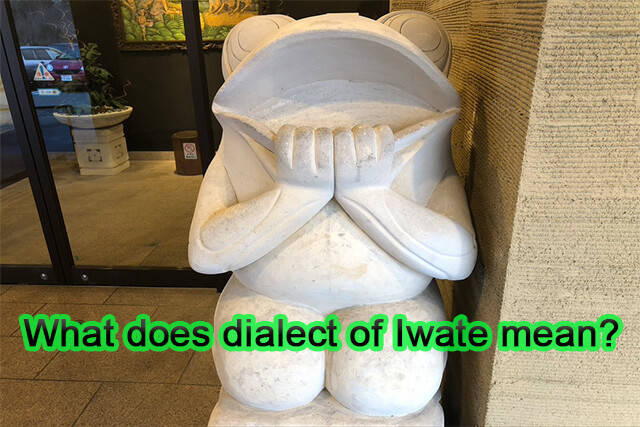What does dialect of Iwate mean? 岩手の方言紹介します!
おばんですryoです。
一括りに日本語といっても、日本には地域ごとにたくさんの方言が存在します。
初めて小学生の時に関東へ行った際、自分の使っていた方言が通じず驚いたことがあります。笑
標準語だと思っていても、意外と方言だったということもありますしね。
岩手にはたくさんも方言があり、面積が広いこともあり地域によって違いもあります。
今日は、岩手の方言について英語の意味や例文を交えながら紹介します。
In Iwate, there a lot of dialects.
Even within Iwate, The dialect differs depending on the region.
I will introduce the dialect of Iwate.
- おばんです(obandesu)
- いがった(igatta)
- なんもなんも(nanmo nanmo)
- んだ んだ(nda nda)
- もうしわけね(mousiwakene)
- けっぱれ(keppare)
- だがら(dagara)
おばんです(obandesu)
岩手弁:おばんです(obandesu)
標準語:こんばんは
English meaning:Good evening
夕方の挨拶によく使います。自分のブログの書き出しもいつもこの方言を使用しています。
ex. Obandesu(Good evening), I can see the beautiful moon tonight.
いがった(igatta)
岩手弁:いがった(igatta)
標準語:よかった
English meaning:Good
日常的に良く使用する方言です。
ex. M: I had a cold last week, but I have got well now.
F: Igatta(good), I was worried.
なんもなんも(nanmo nanmo)
岩手弁:なんも なんも(nanmo nanmo)
標準語:どういたしまして
English meaning:You are welcome
何か相手にしてあげたり物をあげたりして、相手から感謝された際、どういたしまして、気にしなくて良いよという意味で使います。
ex. M: I spent good time. Thank you for bringing me.
F: Nanmo nanmo(You are welcome), I enjoyed it too.
んだ んだ(nda nda)
岩手弁:んだ んだ(nda nda)
標準語:そうだね(同意)
English meaning:You’re right or Yeah
相手の意見などに対して同意を表す時に使用します。
ex. M: The movie we watched yesterday was interesting.
F: Nda nda(You’re right), It’s the best movie I’ve seen in years.
もうしわけね(mousiwakene)
岩手弁:もうしわけね(mousiwakene)
標準語:ごめんなさい
English meaning:Sorry
謝罪の際に使う方言です。
ex. Mousiwakene(Sorry), I couldn’t keep our promise.
けっぱれ(keppare)
岩手弁:けっぱれ(keppare)
標準語:頑張れ
English meaning:hang in there
スポーツの応援などで使う方言です。
ex. Keppare(Hang in there), it’s almost a goal.
だがら(dagara)
岩手弁:だがら(dagara)
標準語:そうだね(同意)
English meaning:You’re right or Yeah
んだと同様に、相手の意見に対して同意する際に使用します。
ex. M: This test was very difficult.
F: Dagara(You’re right), I couldn’t finish everything in time.
だがらはよく、「疑問に思っているの?」と勘違いされることもありました。
実は同意の意味が込められていたんです。
方言も日本の伝統的文化の1つだと思っています。
岩手にはまだまだたくさんの方言があり、これから少しづつ紹介していこうと思います。
Did you enjoy it?
I will introduce the dialect of Iwate more next time.

